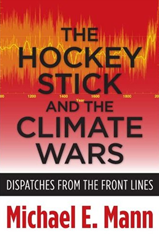The forces of anti-science descend on Amazon.com: Michael Mann and the Climate Wars
 As anyone with the slightest interest in Earth’s climate knows, the Merchants of Doubt have been hired by the fossil fuel industries to attack climate science, in the same way that the tobacco industry attacked studies linking smoking to lung cancer. For a neat graphical summary of the history of attacks on climate science, check out Graph of the Day: Climate Anti-Science Activities, 1989-2010. Now, eminent climate scientist Michael Mann has written a book describing what it’s like to be on the receiving end of an orchestrated anti-science campaign: The Hockey Stick and the Climate Wars: Dispatches from the Front Lines. The book has garnered favorable reviews from such notables as Chris Colose, Peter Gleick, and John Cook. But the forces of anti-science don’t rest, and the Amazon.com comments page has collected a swarm of negative reviews from climate science denialists, probably at the suggestion of infamous anti-science ideologue Anthony Watts and his blog post from 8 February 2012. You can strike a measurable blow for science by going to the comments page and clicking “No” to the question, “Was this review helpful to you?” on the obviously trollish reviews, for example:
As anyone with the slightest interest in Earth’s climate knows, the Merchants of Doubt have been hired by the fossil fuel industries to attack climate science, in the same way that the tobacco industry attacked studies linking smoking to lung cancer. For a neat graphical summary of the history of attacks on climate science, check out Graph of the Day: Climate Anti-Science Activities, 1989-2010. Now, eminent climate scientist Michael Mann has written a book describing what it’s like to be on the receiving end of an orchestrated anti-science campaign: The Hockey Stick and the Climate Wars: Dispatches from the Front Lines. The book has garnered favorable reviews from such notables as Chris Colose, Peter Gleick, and John Cook. But the forces of anti-science don’t rest, and the Amazon.com comments page has collected a swarm of negative reviews from climate science denialists, probably at the suggestion of infamous anti-science ideologue Anthony Watts and his blog post from 8 February 2012. You can strike a measurable blow for science by going to the comments page and clicking “No” to the question, “Was this review helpful to you?” on the obviously trollish reviews, for example:  You can confirm the trolls by clicking “See all my reviews” – if this is the only review they’ve ever written, and they gave the book one star, while emitting the usual long-debunked talking points, you can be confident it’s a troll review. Even better, you can support Dr. Mann and climate science by buying his book, which Desdemona did as soon as it was available. Here’s the publisher’s description:
You can confirm the trolls by clicking “See all my reviews” – if this is the only review they’ve ever written, and they gave the book one star, while emitting the usual long-debunked talking points, you can be confident it’s a troll review. Even better, you can support Dr. Mann and climate science by buying his book, which Desdemona did as soon as it was available. Here’s the publisher’s description:
In its 2001 report on global climate, the Intergovernmental Panel on Climate Change of the United Nations prominently featured the “Hockey Stick,” a chart showing global temperature data over the past one thousand years. The Hockey Stick demonstrated that temperature had risen with the increase in industrialization and use of fossil fuels. The inescapable conclusion was that worldwide human activity since the industrial age had raised CO2 levels, trapping greenhouse gases in the atmosphere and warming the planet. The Hockey Stick became a central icon in the “climate wars,” and well-funded science deniers immediately attacked the chart and the scientists responsible for it. Yet the controversy has had little to do with the depicted temperature rise and much more with the perceived threat the graph posed to those who oppose governmental regulation and other restraints to protect our environment and planet. Michael E. Mann, lead author of the original paper in which the Hockey Stick first appeared, shares the real story of the science and politics behind this controversy. He introduces key figures in the oil and energy industries, and the media front groups who do their bidding in sometimes slick, bare-knuckled ways to cast doubt on the science. Mann concludes with an account of the “Climategate” scandal, the 2009 hacking of climate scientists’ emails. Throughout, Mann reveals the role of science deniers, abetted by an uninformed media, in once again diverting attention away from one of the central scientific and policy issues of our time.
The Hockey Stick and the Climate Wars: Dispatches from the Front Lines
Brilliant strategy for addressing troll reviews on Amazon — thanks!
Silly question. Is there any way to get you to review your conclusion that there is no speculation posing as science in this affair : or are you going to blindly follow the rubric 'scientists say' while holding your ears and chanting 'anti science' and 'deniers suck' as if it was anything but a desperate attempt to claim to know what others are thinking….while saying that predicting the future is verifiable and verified.
Is there any way to get you consider that climate scientists actually know what they're talking about?
If you read a college-level textbook on climate science, the scales will fall from your eyes. I recommend Ray Pierrehumbert's excellent Principles of Planetary Climate, which I had a small role in editing. It's very accessible, requiring only first-year calculus and some knowledge of differential equations.